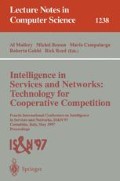Abstract
A framework for supporting agent programming systems, called AgentSpace, is proposed in this paper. Our goal is to define an abstract and generic world of agents that is a super-set of research and industrial proposals currently being developed. There are mainly two novelties in this paper. First, we argue that real-world complex agent-based applications span through three levels: framework, programming system and application level itself. The second novelty is that, unlike many other proposals, our programming model focus on heterogeneous multi-agent applications.
Preview
Unable to display preview. Download preview PDF.
References
M.P. Atkinson, L. Daynès, M.J. Jordan, T. Printezis and S. Spence. An orthogonally persistent Java. SIGMOD Record. 1996.
K. Arnold, J. Gosling. The Java Series — The Java Programming Language. Addison-Wesley Publishing, 1996.
M.P. Atkinson, M. Jordan, L. Daynès and S. Spence. Design issues for Persistent Java: A type-safe, object-oriented, orthogonally persistent system. In Proceedings of The Seventh International Workshop on Persistent Object Systems (Cape May, New Jersey, USA, May 29–31, 1996). Morgan Kaufmann Publishers, 1996.
K. Bharat and L. Cardelli. Migratory applications. Proceedings of the ACM Symposium on User Interface Software and Technology 1995 (Pittsburgh, PA, Nov 1995). 1995.
J. Baumann, C. Tschudin and J. Vitek. Proceedings of the 2nd ECOOP Workshop on Mobile Object Systems (Linz, Austria, July 8–9, 1996). Dpunkt. 1996.
Luca Cardelli. A language with distributed scope. Computing Systems. 8(1):27–59. Jan 1995. (A preliminary version appeared in Proceedings of the 22nd ACM Symposium on Principles of Programming Languages.)
L. Cardelli. Global Computation. Position Paper. 1996.
D. Chess, B. Grosof, C. Harrison, D. Levine, C. Parris. Itenerant Agents for Mobile Computing. IEEE Personal Communications. 2(5):34–49, Oct. 1995.
Paolo Ciancarini, Robert Tolksdorf, Fabio Vitali. PageSpace: An architecture to coordinate distribute applications on the web. Computer Networks and ISDN Systems. 28, 941–952, 1996.
R. Gray. Agent Tcl: a transportable agent system. Proceedings of the CIKM Workshop on Intelligent Information Agents, (CIKM'95), 1995.
C. Harrison, D. Chess, A. Kershenbaum. Mobile Agents: Are they a good idea?. IBM, 1995.
IBM Tokyo Research Laboratory. Aglets workbench: Programming mobile agents in Java. http://www.trl.ibm.co.jp/aglets. 1996.
M. Mira da Silva. Models of higher-order, type-safe, distributed computation over autonomous persistent object stores. PhD Thesis, University of Glasgow. (Submitted in December 1996.)
M. Mira da Silva and M. Atkinson. Combining mobile agents with persistent systems: opportunities and challenges. In [BTV96].
M. Mira da Silva and A. Silva Insisting on Persistent Mobile Agent Systems with an Example Application Area. Accepted to the First International Workshop on Mobile Agents, 1997.
T. Magedanz, K. Rothermel and S. Krause. Intelligent agents: an emerging technology for next generation telecommunications. Proceedings of INFOCOM'96, San Francisco, USA, 1996.
H. Nwana. Software Agents: An Overview. Knowledge Engineering Review. 11(3), 1–40. Cambridge University Press, 1996.
A. Silva, J. Borbinha and J. Delgado. Organizational management system in a heterogeneous environment: a WWW case study. Proceedings of the IFIP working conference on information systems development for decentralized organizations (Trondheim, Norway, August 1995). Pages 84–99. 1995.
M. Strasser, J. Baumann and F. Hohl. Mole: A Java-based mobile object system. In [BTV96].
A. Silva, M. Mira da Silva, J. Delgado. A Survey of Web Information Systems. Submitted to the WWW'97 Conference. 1997.
C. Tham, B. Friedman. Common Agent Platform Architecture. General Magic, Oct. 1996.
James White. Telescript technology: The foundation for the electronic marketplace. General Magic White Paper, General Magic, 1994.
M. Wooldridge, N. Jennings. Intelligent Agents: Theory and Practice. Knowledge Engineering Review. 10(2), 115–152. Cambridge University Press, 1995.
Author information
Authors and Affiliations
Editor information
Rights and permissions
Copyright information
© 1997 Springer-Verlag Berlin Heidelberg
About this paper
Cite this paper
Silva, A., da Silva, M.M., Delgado, J. (1997). Motivation and requirements for the AgentSpace: A framework for developing agent programming systems. In: Mullery, A., Besson, M., Campolargo, M., Gobbi, R., Reed, R. (eds) Intelligence in Services and Networks: Technology for Cooperative Competition. IS&N 1997. Lecture Notes in Computer Science, vol 1238. Springer, Berlin, Heidelberg. https://doi.org/10.1007/3-540-63135-6_17
Download citation
DOI: https://doi.org/10.1007/3-540-63135-6_17
Published:
Publisher Name: Springer, Berlin, Heidelberg
Print ISBN: 978-3-540-63135-4
Online ISBN: 978-3-540-69155-6
eBook Packages: Springer Book Archive

